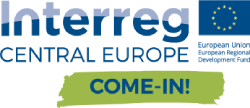Project COME-IN!
Projekt Come-In!

The project COME-IN! (Cooperating for Open access to Museums – towards a widEr INclusion) is funded under theInterreg CENTRAL EUROPE Programme and aims at enhancing the CE cultural heritage, increasing the capacities of small and medium size museums, by making them accessible to a wider public of people with different kinds of disabilities.
The Central European Initiative – Executive Secretariat, in its capacity as Lead Partner, coordinates a multifaceted network of 14 Museums, disability associations, dcademic representatives, training institutions and policy makers from the Central Europe area, who will strive to define transnational high-level standards and ensure know-how transfer to guarantee accessibility to museums involved in the project. Guidelines will be developed to help organise accessible collections and exhibitions and a training handbook for museum operators will be made available.
An innovative promotional tool, the COME-IN! label will be developed to award museums complying with the established accessibility standards. The label will be promoted at transnational, national and local level to ensure its sustainability and transferability.
The project started on 1 July 2016 and will run until 30 June 2019.
participants:
Leader Partner:
Partners:
- Civic Museum and Galleries of History and Art, Italy
- The Regional Council of Associations of the People with Disabilities and their Families of the Friuli Venezia Giulia Region, Italy
- ACLI Vocational Training Body of Friuli Venezia Giulia Region, Italy
- Maritime museum “Sergej Mašera” Piran, Slovenia
- Museum of Working World, Austria
- Archeological Museum of Istra, Croatia
- OZIV – Austrian Civil Disabled Association, Austria
- BBRZ – Vocational Training- and Rehabilitation Centre, Austria
- University of Applied Sciences Erfurt in Thuringia, Germany
- Archeological Museum Weimar, Germany
- NETZ – Media and Society, Germany
- Archaeological Museum in Krakow, Poland
- Municipality of Piran,Slovenia
Associated Partners:
- The Commissioner of Thuringia for disabled People, Germany
- Museum and Florentine Istitute of Prehistrics, “Paolo Graziosi”, Italy
- Services Centre for people with disability, University of Siena, Italy
- Chance for the blind foundation, Poland
- National Association of Italian Municipalities– ANCI FVG, Italy
- Municipality of Steyr, Austria
- Autonomous Region Friuli Venezia Giulia – Central Directorate for culture, sport and solidarity, Italy
- Center for the correction of the hearing and the speech Portoroz, Slovenia
- Association of the Blind of Istria County, Croatia
COME-IN! GUIDELINES presentation in Kraków
Kraków, 6TH Jully 2017
July 6th 2017, “COME-IN! Guidelines”, a document prepared by the international team of the project COME-IN! Cooperating for Open access to Museums towards a widEr INclusion” will be presented during the meeting dedicated to the project „Małopolska – Kultura Dostępna” (Małopolska Region – Accessible Culture), led by the Marshall Office of the Małopolska Region. “COME-IN! Guidelines” are practical tool for designing and organising exhibitions and collections accessible for people with disabilities, and to provide all people with the opportunity to participate more fully in culture. For more information see www.interreg-central.eu/Content.Node/COME-IN.html
Prahistoria dla wszystkich/ Prehistory for all

On 12th March, the Archaeological Museum in Kraków launched its new accessible exhibition.
The Museum has put in place an archeological multisensorial exhibition adapted for visitors with disabilities. Among the different interventions, the museum has created tactile maps and captions with the Braille alphabet of copies of museum objects, made from original raw materials.
Information on objects, in the form of audiodescription, simplified language and Polish Sign Language, can be found in the application module on the new website of the Museum, realized as part of the project.
The event was attended by representatives of project partners, policy makers, the Office for People with Disabilities, Interest groups including NGOs, Education/training center and schools as well as cooperating museums.
The event ended with a concert of students of the harp class from the Bronisław Rutkowski Music School in Kraków, The Primary Music School and The Secondary Music School.
M. Wawer
